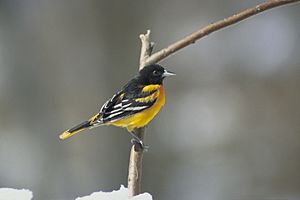New World oriole facts for kids
Quick facts for kids New World orioles |
|
|---|---|
 |
|
| Baltimore oriole, Icterus galbula | |
| Scientific classification |
|
| Kingdom: | Animalia |
| Phylum: | Chordata |
| Class: | Aves |
| Order: | Passeriformes |
| Family: | Icteridae |
| Genus: | Icterus Brisson, 1760 |
| Species | |
|
25-30 species |
|
New World orioles are a group of birds in the genus Icterus. They are in the blackbird family, and not related to Old World orioles of the family Oriolidae. Icterid species are strikingly similar in size, diet, behaviour, and strongly contrasting plumage to Old World orioles. This is a good example of convergent evolution.
Males are typically black and vibrant yellow or orange with white markings, females and immature birds duller. They moult annually. New World orioles are generally slender with long tails and a pointed bill. They mainly eat insects, but also enjoy nectar and fruit. The nest is a woven, elongated pouch. Species nesting in areas with cold winters are strongly migratory, while subtropical and tropical species are more sedentary (do not migrate.
The name "oriole" was first recorded (in the Latin form oriolus) by Albertus Magnus in about 1250, which he stated to be onomatopoeic, from the song of the European golden oriole.
The genus name Icterus as used by classical authors, referred to a bird with yellow or green plumage. In modern times this has been identified as the golden oriole. Brisson mistakenly re-applied the name to the New World birds because of their similarity in appearance.
See also
 In Spanish: Icterus para niños
In Spanish: Icterus para niños

